It was a mid-week evening event (December 10) and the first of its kind for downtown Edmonton’s Centre High Campus (CHC). The guests were outstanding, the commentary was both insightful and educational and the forty or so Grade 12 students and others who attended the school’s inaugural Indigenous Literacy Event Program enjoyed the two and a half hour conversation, and offered plenty of food for thought with their insightful after-event questions.
The evening got underway with a prayer and a welcome by Edmonton Elder Francis Whiskeyjack, but not before the gathering was treated to a tasty selection of snacks. The two MCs for the evening, Grade 12 students Simon Shaimaiyuk and Kingsley Ranville, both first year students at the school, provided a few words, a few laughs and several introductions over the course of the evening.
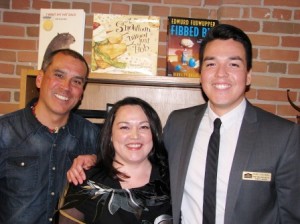
Guest speakers Dr. Dwayne Donald and Dr. Trudy Cardinal and Centre High Aboriginal Liaison Naim Cardinal. Article and photos by John Copley
The campus’s First Nations Métis & Inuit Liaison, Naim Cardinal, addressed the gathering and introduced the CHC Indigenous Student Leadership.
He said, “Communication and the ability to express ourselves has always been an important element of who we are as people. It is important to maintain that ability and the knowledge of our past – just as it is important to encourage others to learn their languages and maintain them. We wanted to put together an initiative that would embrace such things as oral history, storytelling, and the many teachings that are out on the land. This is an entirely youth-led event – they even gathered the snacks, made the coffee and set up the tables.”
The Indigenous Student Leadership group that Naim was referring to includes both Ranville and Shaimaiyuk as well as Savannah Dreaver, Mirsada Hodzic, Zach Walker, Cheri Ashley, Michael Essex and Nick Omeasoo.
After a brief introduction and a few words by the students Cardinal noted: “This is an awesome group and I’m very lucky and honoured to be able to work with them every day, and to be here at the school to help guide them on their journey.”
Two special guest speakers, Dr. Dwayne Donald and Dr. Trudy Cardinal addressed the students during the first part of the evening’s program while celebrated First Nations artist Aaron Paquette took to the podium to read a passage from his newly published book, “Lightfinder.”
Dr. Donald and Dr. Cardinal both spoke on the subject, Literacy as Connectivity.
Dr. Donald acknowledged participant Elder Francis Whiskeyjack, commending him for the fine work he does at Amiskwaciy Academy and the extra work he does quietly and confidently throughout the Aboriginal community and beyond.
Then he explained that literacy is not just about writing words on paper, it actually goes much deeper than that when you think about it in terms of connections.
“Literacy in the sense of connectivity is understanding the power of speech, the power of listening, the power that comes with using your hands when you’re making things, the power of the experiential, the power of stories and a more holistic understanding of what literacy can be for us. Literacy comes with the ability to participate. Literacy and connectivity increases with one’s ability to understand the world around them and to participate in and finish as many tasks and opportunities as you can. Literacy is actually connected to just about everything we do and all of the new things we learn; each experience gives us a little more knowledge and thus a better opportunity to express ourselves in ways that are connected and understood.”
Dr. Donald, a descendant of the Amiskwaciwiyiniwak and Papaschase Cree, works as an Associate Professor in the Faculty of Education at the University of Alberta.
Dr. Trudy Cardinal is an Assistant Professor in the University of Alberta’s Department of Elementary Education. She was an elementary school teacher for 13 years before entering graduate school. She told the gathering she was invited to the event by Dr. Donald and had already heard about Naim from members of the community, people who told her that he was doing great things and “from students she had been working with on different research projects, who speak very highly of him.”
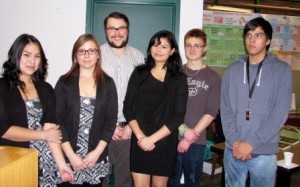
Centre High Campus Indigenous Student Leadership members (l-r): Savannah Dreaver, Mirsada Hodzic, Zach Walker, Cheri Ashley, Michael Essex and Nick Omeasoo
She explained her understanding of the term literacy. “When I think about literacy I think about stories,” said Dr. Cardinal. “I think about conversations and I think about relationships because that’s what literacy is really all about, understanding who we are both as individuals and collectives and sharing our experiences with others.”
She spoke about her experiences growing up first as a Cree Metis literacy learner who went on to teach other literacy learners and “finally to teaching the future teachers who will carry on teaching even more Aboriginal literacy learners.” Cardinal said when she is confused about the real meanings of Aboriginal literacy, she “tends to run to the experts in the field of research” and seeks out their words and “the way they articulate their knowing and understanding of literacy.”
Since completing her doctorate in the fall of 2013 Dr. Cardinal has taught several hundred courses that focus on literacy issues.
“In each of these courses,” she added, “I’ve asked my students to tell me about their early literacy landscape because I believe stories told from experiences shape the way we understand and think about literacy. This is often difficult because many of these stories bring back memories about struggle and hardship and feeling very silent. I ask my students to write so that I can ‘hear’ them. I think literacy is about stories, about the stories we share, stories we tell, stories we hear from our Elders, stories we have come to live by and by retelling them we relive those experiences once again. Literacy is how we make sense of the world and who we are becoming in it. I don’t disregard best practice or great pedagogy or the need for understanding curriculum as planned or curriculum as lived but I have come to know that need for the privileged experience of stories because that’s what literacy in an Indigenous context means to me.”
When Aaron Paquette got up to read a passage from his new book, Lightfinder, everyone sat up and paid attention. He told stories about his stepdad and why because of a bad stutter that he had, people often thought him to be lacking intelligence and not as smart as they were. “But he was a great reader of people and had other ways of knowing,” explained Paquette. “He didn’t find the need to talk a lot and in fact his greatest weakness became his biggest strength. He shared stories with me, stories he hadn’t talked about with other people.”
Paquette noted that he followed in his step dad’s footprints when it came to non-verbalized ways of teaching – “because that is what I also do through my paintings.”
And when those that taught him art tried to take his personal experiences out of his work he rebelled because he knew that to communicate effectively, one has to talk about or otherwise express their feelings and their knowledge in whatever form they take to tell those stories.
“That is what I think is the key to Indigenous literacy, the ability to express your thoughts and ideas, sometimes in ways that are different than the approach taken by others.”
Aaron Paquette grew from those experiences and today is well known and highly respected as an artist, keynote speaker, workshop facilitator, illustrator and political commentator.
“Events such as this one are important undertakings,” noted Naim Cardinal.
“I feel as though people need to see literacy in more ways than reading and writing. The ability to read and write are important but we all carry our own ways of knowing and understanding. We wanted to be able to share that and look at literacy in a traditional sense: language, experience, storytelling, oral history, traditional knowledge and histories. Not everybody thinks about literacy in that way and we wanted to share the importance of realizing that we are all literate in some way.“
Naim continued, “I feel as though the speakers we introduced at this event were powerful in expressing that for everybody. Our youth were very inspired following our event and were thankful for what was shared with them.”
by John Copley

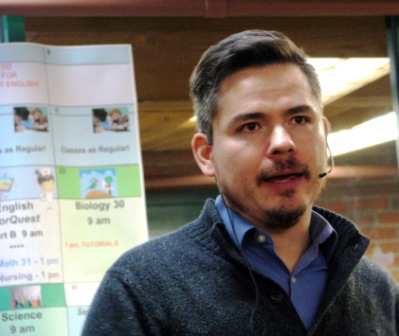
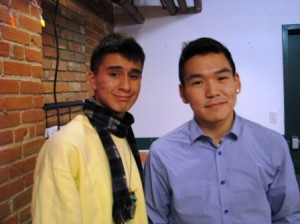
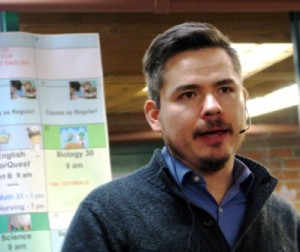

Be the first to comment on "Centre High event focuses on Indigenous Literacy"